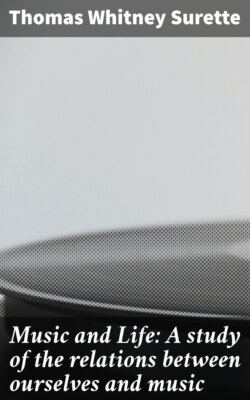Читать книгу Music and Life: A study of the relations between ourselves and music - Thomas Whitney Surette - Страница 11
На сайте Литреса книга снята с продажи.
I. TRAINING THE SENSE FOR BEAUTY
ОглавлениеTable of Contents
In what I have to say about music for children I am not unmindful of the diversity of American life, and of the prevalent idea that Americans do not pay much attention to music (or to any other form of beauty) because they live in a new country in which the greater part of their energy is devoted to subduing nature and carving their fortunes. As a nation we are said to be too diverse to have evolved any definite æsthetic practice, and we suppose ourselves too busy with the practical things in life to pay much attention to it.
While it is doubtless true that there are numberless prosperous American families in which the words “art” and “literature” mean nothing whatever, this condition is due, in most cases, not to lack of time, but to lack of inclination. We, like other people, do what we like to do. No real attention is paid in childhood to the cultivation of a love of the beautiful; very little attention is paid to it in the educational institutions where we are trained; so we grow up and enter upon life with a desultory liking for music, with a distinct lack of appreciation for poetry, and with almost no interest in painting or sculpture.
And this condition is likely to increase rather than diminish as time goes on, until, having finally arrived at moments of leisure and finding that neither our money nor any other material possession gives us any deep or permanent satisfaction, we turn to beauty only to be confronted with the old warning: “Too late, ye cannot enter now.” For we have arrived at the time when, in Meredith’s phrase, “Nature stops, and says to us, ‘Thou art now what thou wilt be.’” For this capacity for understanding and loving great books and paintings and music has to grow with our own growth and cannot be postponed to another season. The average American man is supposed to have no time for these things. He has time, but he refuses to turn it into leisure,—leisure which means contemplation and thoughtfulness,—though he very likely knows that this has been accomplished over and over again by men who have saved out of a busy life for that purpose a little time every day.
One recalls Darwin’s pathetic statement wherein he describes his early love for poetry and music, and the final complete loss of those “capabilities” through neglect. “The loss of these tastes,” he says, “is a loss of happiness, and may possibly be injurious to the intellect, and more probably to the moral character by enfeebling the emotional part of our nature.”
The intellect of man, in itself, is never supreme or sufficient. Feeling or instinct is half of knowledge. “Whoever walks a furlong without sympathy,” says Whitman, “walks to his own funeral drest in his shroud.” Of any man, American or otherwise, who lives his life unmindful of all beauty we may justly say, as Carlyle said of Diderot, “He dwelt all his days in a thin rind of the Conscious; the deep fathomless domain of the Unconscious whereon the other rests and has its meaning was not under any shape surmised by him.”
Must not the education of children in beauty begin, then, with their parents? Must they not be aroused, at least, to an intellectual conviction of its value, even though they have missed its joy? Can the matter be safely left to the jurisdiction of the schools themselves whose curricula are already overcrowded with methods of escape from this very thing? Does not the school answer the general conception of education obtaining among the fathers and mothers of the school-children? Can it be expected—is it possible for it—to rise far above that conception? My object is therefore to suggest, first, that the perception of beauty is, in the highest sense, education; second, that music is especially so, because it is the purest form of beauty; and, third, that music is the only form of beauty by means of which very young children can be educated, because it is the only form accessible to them.
Need I point out that there has never been a time in the history of mankind when human beings have not paid tribute to beauty? In their attempt to escape what may be called the traffic of life and to rise above its sordid limitations, have they not always and everywhere created for themselves some sort of detached ideal by means of which they justified themselves in an otherwise unintelligible world? This ideal may have been a god of stone, but it figured for them a perfect absolution. Surrounded by brutal forces about which they knew nothing, subject to pestilence, to war, to starvation, to the fury of the elements, unable safely to shelter their bodies, they built for their souls a safe elysium. This ideal was always one of order and beauty; every civilization has possessed it, and it was to each civilization not only religion, but also what we call “art.”
I referred in the first chapter to that quality in art which consists in its “holding a mirror up to nature,” and thus focusing our attention. Browning expresses this in “Fra Lippo Lippi,” where he says,—
